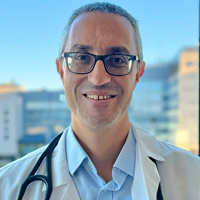
By Merin C. MacDonald
Department of Medicine neuro-oncologist stresses the necessity of clinical trials for brain tumor patients
“Despite a lot of research in the field, for primary brain tumors like glioblastoma, the average survival is usually just over a year—and that’s with treatment.” – David Cachia, MD
For David Cachia, MD, interim chief, executive council chair, and associate professor of medicine in the Division of Hematology/Oncology, the path to becoming a neuro-oncologist began during his Neurology residency at UMass Chan Medical School. “I was looking for an area in neurology where I would have clinical contact with patients and their families, but there would also be research opportunities,” said Dr. Cachia, who now serves as director for the Neuro-Oncology Program at UMass Memorial Medical Center (UMMMC). “In neuro-oncology, with primary brain tumors, there is a lot that is unknown and unfortunately, treatment options are limited. I thought it would be a good mix of patient contact and clinical research.” Guided by advice from Lloyd Alderson, MD, a neuro-oncologist at UMass at the time, Dr. Cachia immersed himself in the field by attending and presenting at conferences. “Dr. Alderson advised me to go and present at neuro-oncology conferences because there, I would meet my potential future colleagues and see where the field was,” he said. Attending these conferences reinforced his interest and he went on to complete a Neuro-Oncology fellowship at MD Anderson in Houston.
Following his fellowship at MD Anderson, Dr. Cachia joined the faculty at the Medical University of South Carolina, launching his clinical practice and serving as principal investigator on several clinical research trials. Then, during the pandemic, a Zoom retirement party for one of his ex-attendings at UMass led to a chance conversation where he learned of an opening for a neuro-oncologist at UMMMC. After five years in South Carolina, Dr. Cachia returned to Worcester in 2021. “There were a lot of reasons to come back,” he said. “The training I received in neurology was excellent and I had very good memories of UMass. I was looking to take the next step in my career and it was a great opportunity to start a neuro-oncology program here.”
Over the past three and a half years Dr. Cachia, along with his team, has established a neuro-oncology program at UMMMC and has opened six clinical trials for primary brain tumor patients. These trials offer patients the latest in the scientific field based on preclinical research that shows the benefits of various therapeutics.
In one of his trials for patients with glioblastoma, he and his team are looking at combining immunotherapy and radiation for patients whose tumor has grown back. “In the last 10 years immunotherapy has exploded in the field of oncology,” Dr. Cachia said. “For glioblastoma, however, we are still looking to find the right combination and what is the right drug for our patients. This trial is trying to answer that question.”
In another trial that recently closed, Dr. Cachia and his team investigated using tumor treating fields therapy in combination with radiation. The patient would place a device on their head that generated an alternating electrical field stopping tumor cells from dividing. “We aimed to find out if there was an added benefit in trying to slow tumor growth by using these alternating electrical fields during radiation compared to after radiation,” said Dr. Cachia.
Dr. Cachia emphasized the importance of collaboration in caring for his patients who are both on and off clinical trials. He frequently speaks with Jennifer Reidy, MD, MS, chief of the Division of Palliative Care and associate professor of family medicine & community health, and they have a psychologist, Tim Sannes, PhD, who works with their patients. “People define quality of life differently and trying to maintain what the patient wants to do while continuing with treatment and trying to extend their life for as long as we can is sometimes a difficult balance,” said Dr. Cachia. "Over time I think we've come to realize, especially in neuro-oncology, the importance of survivorship, of quality of life, of trying to maintain the patient’s cognitive function, and their ability to interact meaningfully.” Collaboration with Palliative Care and Psychiatry helps support this holistic patient care.
As he continues to build the Neuro-Oncology Program at UMMMC, Dr. Cachia said that working with colleagues at different institutions is essential to the progress of treatments for patients with primary brain tumors. “We realized many years ago that this is not something one person is going to solve. These are rare tumors so you need to work across institutions to enroll patients in larger clinical trials and get meaningful results. Working together and sharing data and information will hopefully lead to a cure.”
We thank Dr. Cachia for his devoted care to his patients and for the clinical research that is making an impact on our patients’ quality of life.
Learn more about Dr. Cachia’s current clinical trials.
